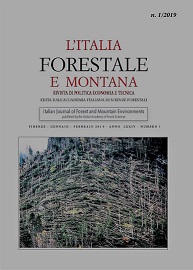Published
2019-07-16
Keywords
- forest regulation methods,
- systemic silviculture,
- complexity,
- fully regulated forest
Abstract
For a long time, forest practice has been characterized by a linear paradigm: forest cultivation and management have been centred on the volume/regeneration relationship, considered respectively source of income and basis for sustained production. According to this paradigm, forest management has worked out a series of forest regulation methods with the aim of obtaining the “fully regulated forest”. These methods are firmly anchored to the mechanistic view of nature. Considering the forest as a complex adaptive system means overcoming the reductionist and mechanist paradigm and entails a shift towards a systemic approach in silviculture and forest management. The objectives and theoretical assumptions of classical forest regulation methods are discussed according to the new systemic paradigm. Managing forests as complex adaptive systems and sustaining their ability to adapt to future changes is possible only if there is also a change in forest management methods so that they are consistent with the new theoretical approach.


